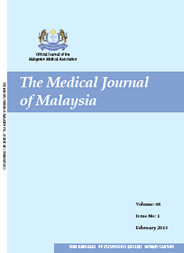MJM, Vol 70 Supplement 1 September 2015
Effectiveness of e-mail based empowerment programme
(e-beEp) among Type II diabetes patients on glycaemic control, quality of life
and cost-effectiveness: an intervention study
*Department of Community Health, UKM Medical Centre, Malaysia, **Department of Medicine, UKM Medical Centre, Malaysia, ***Department of Medicine, Hospital Putrajaya, Malaysia, ****Putrajaya Health Clinic, Putrajaya, Malaysia, *****Bandar Baru Bangi Health Clinic, Bangi, Malaysia
ABSTRACT
Introduction: The internet is a potential effective medium for information exchange and delivery of effective behaviour change interventions to large numbers of participants. This study aimed to evaluate the effectiveness of e-mail based empowerment programme (e-beEp) on glycaemic control, quality of life and cost-effectiveness among Type II Diabetes Mellitus patients as compared to the standard care in primary care settings.
Methods: The e-beEp was designed to deliver health education for 12 weeks duration for intervention group with five different modules. A total of 142 patients were recruited for intervention and control groups in two health clinics with response rate was 98.6% for both clinics. Patients’ HbA1c, quality of life score and empowerment level were taken before, three and six months after the intervention.
Results: Repeated measurement analysis shows significant differences in the mean of quality of life score for psychological domain (F=3.194, p=0.009), quality of life score for environmental domain (F=7.723, p=0.006) and overall empowerment score (F=17.312, p<0.001) between the intervention and control groups. Empowerment score (F=5.909, p=0.015) and quality of life score for psychological domain (F=5.416, p=0.007), social domain (F=5.378, p=0.021), environmental domain (F=6.072, p=0.003) increase significantly in the intervention group as compared to the control group over the time. However, there were no significant time effects of HbA1c level, quality of life score and empowerment score for both groups. Cost-effectiveness analysis showed e-beEp intervention required only minimal cost (RM5906.65) to reduce HbA1c reading by 1% and above after six months of intervention as compared to the control group (RM6733.32).
Conclusion: This study showed that combination of e-beEp and standard care is more effective compared to the standard diabetes care alone in terms of quality of life, patient’s empowerment and cost-effectiveness. However, longer duration of implementation of e-beEp is required to ensure the effectiveness on glycaemic control.
Keywords: Effectiveness, e-mail, empowerment, glycaemic control, quality of life, cost-effectiveness
